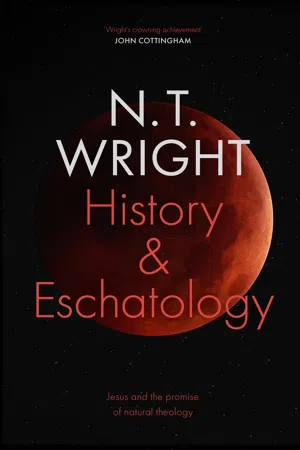![]()
Notes
PREFACE AND ACKNOWLEDGMENTS
1See my essay, ‘Get the Story Right and the Models Will Fit: Victory through Substitution in “Atonement Theology”’, in Atonement: Sin, Salvation and Sacrifice in Jewish and Christian Antiquity (papers from the St Andrews Symposium for Biblical Studies, 2018), ed. M. Botner, J. Duff and S. Dürr (Grand Rapids: Eerdmans, 2019). See too ‘Reading Paul, Thinking Scripture: “Atonement” as a Special Study’, in my Pauline Perspectives (London: SPCK, 2013), 356–78, and also The Day the Revolution Began (London: SPCK, 2017) (hereafter Revolution).
2Karl Barth, ‘Nein!’ in Natural Theology: Comprising ‘Nature and Grace’ by Professor Dr. Emil Brunner and the Reply ‘No!’ by Dr. Karl Barth, trans. Peter Fraenkel (Eugene, Ore.: Wipf & Stock, 2002 [1946]), 74.
3For a historical survey of the development and outcome of the Barth/Brunner debate, cf. J. W. Hart, Karl Barth vs. Emil Brunner: The Formation and Dissolution of a Theological Alliance, 1916–1936 (New York: Peter Lang, 2001). A helpful discussion is that of A. Moore, ‘Theological Critiques of Natural Theology’, in The Oxford Handbook of Natural Theology, ed. Russell Re Manning (Oxford: Oxford University Press, 2013) (hereafter OHNT), 227–44. From a different angle, see A. E. McGrath, Emil Brunner: A Reappraisal (Chichester: Wiley Blackwell, 2014).
4These are only a handful from a wide range of possible definitions. One should at least quote Lord Gifford: ‘[Natural theologians should] treat their subject strictly as a natural science, the greatest of all possible sciences, indeed, in one sense the only science, that of Infinite Being, without reference to or reliance upon any supposed special exceptional or so-called miraculous revelation’ (quoted by Rodney D. Holder, ‘Natural Theology in the Twentieth Century’, OHNT, 118). The Oxford English Dictionary is briefer: ‘Theology based upon reasoning from observable facts rather than from revelation’. Other definitions are offered by, for instance, W. L. Craig and J. P. Moreland: ‘That branch of theology that seeks to provide warrant for belief in God’s existence apart from the resources of authoritative, propositional revelation’ (‘Introduction,’ in The Blackwell Companion to Natural Theology, ed. William Lane Craig and J. P. Moreland [Malden, Mass.: Wiley Blackwell, 2012], ix). Most of these are negative definitions; Alister McGrath offers a positive one: ‘Natural theology can broadly be understood as a process of reflection on the religious entailments of the natural world’ (Re-imagining Nature: The Promise of a Christian Natural Theology [Chichester: Wiley Blackwell, 2017], 7).
5Christopher R. Brewer, ‘Beginning All Over Again: A Metaxological Natural Theology of the Arts’, PhD thesis, University of St Andrews, 2015. See also Christopher R. Brewer, Understanding Natural Theology (Grand Rapids: Zondervan Academic, forthcoming).
6McGrath, Re-imagining Nature, 18–21.
7I have discussed Bultmann’s work, and particularly his Giffords, in chs. 2, 3 and 4 below.
8London: SPCK; San Francisco: HarperOne, 2011.
9In this I have been greatly helped by the ‘Logos’ Institute in St Andrews, whose staff and students have provided challenge, stimulus and direction.
10On the varied reactions to Lisbon 1755, see ch. 1 below. The event stands as a telling shorthand symbol for a complex shift of cultural, philosophical and theological mood.
11See e.g. 1 John 4.2.
12An important study of this area which reached me after I had worked out what I wanted to say on this is E. L. Meeks, Loving to Know: Covenant Epistemology (Eugene, Ore.: Cascade, 2011).
13See P. G. Ziegler, Militant Grace: The Apocalyptic Turn and the Future of Christian Theology (Grand Rapids: Baker Academic, 2018).
14See ‘The Meanings of History: Event and Interpretation in the Bible and Theology’, Journal of Analytic Theology 6 (2018), 1–28.
CHAPTER 1: THE FALLEN SHRINE
1For common definitions of natural theology along these lines, see the preface, p. x, with notes at pp. 279–80.
2On Butler and the Deists see e.g. H. G. Reventlow, The Authority of the Bible and the Rise of the Modern World (London: SCM Press, 1984 [1980]), 345–50.
3See e.g. Iain Murray, The Puritan Hope: Revival and the Interpretation of Prophecy (Edinburgh: Banner of Truth, 1971).
4Addison’s father, Lancelot, was Dean of Lichfield from 1683 to 1703.
5For the singing of the spheres see Cicero, Rep. 6.18. On the cosmology of the Timaeus see now D. J. O’Meara, Cosmology and Politics in Plato’s Later Works (Cambridge: Cambridge University Press, 2017).
6I am reminded of the way some modern hymn-books have altered ‘Jesus loves me, this I know,/ For the Bible tells me so’ to ‘Jesus loves me, this I know,/ And the Bible tells me so’.
7A resident of the Durham diocese, Bewick was born just after Butler’s death. The irony is that farmers were at that time doing their best to alter ‘nature’ by different methods of breeding and feeding. On Bewick’s religious views—a sort of warm Deism, it seems—see J. Uglow, Nature’s Engraver: A Life of Thomas Bewick (London: Faber, 2006), 79.
8For details, see e.g. E. Paice, Wrath of God: The Great Lisbon Earthquake of 1755 (London: Quercus, 2009) and, more generally, B. Hatton, Queen of the Sea: A History of Lisbon (London: C. Hurst, 2018).
9This has been explored especially by S. Naiman, Evil in Modern Thought: An Alternative History of Philosophy (Princeton: Princeton University Press, 2002; repr. with new preface and afterword, 2015)...
